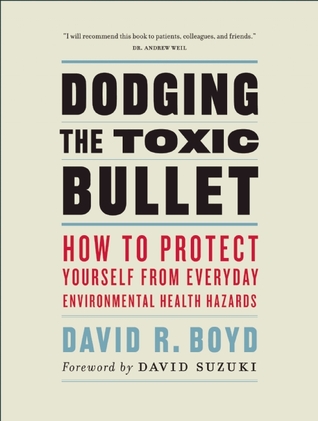David R. Boyd is one of Canada’s leading environmental lawyers, an expert in the field of human health and the environment, and a Trudeau scholar at the University of British Columbia. Boyd draws on this expertise in writing Dodging the Toxic Bullet: How to Protect Yourself from Everyday Environmental Hazards, in which he provides a comprehensive assessment of practical strategies for individuals to avoid environmental health hazards.
David R. Boyd is one of Canada’s leading environmental lawyers, an expert in the field of human health and the environment, and a Trudeau scholar at the University of British Columbia. Boyd draws on this expertise in writing Dodging the Toxic Bullet: How to Protect Yourself from Everyday Environmental Hazards, in which he provides a comprehensive assessment of practical strategies for individuals to avoid environmental health hazards.
The book begins by introducing the reader to the myriad health issues linked to environmental toxins, including various cancers, developmental disorders, neuro-degenerative diseases and reproductive health problems. Importantly, Boyd notes that environmental health hazards are unique in their ability to move beyond geographical borders through air currents, water cycles, food systems and within imported products. We also continue to be effected by pollution in the forms of contaminated storage sites, abandoned mines and leaching from landfills.
Dodging the Toxic Bullet offers three distinct categories of environmental hazards: chemical hazards such as pesticides; biological hazards such as mould; and physical hazards such as radiation. While people can be exposed a number of ways, some groups are more susceptible than others (those in poverty, people with compromised immune systems, the elderly). Boyd also points to environmental justice literature which demonstrates that minority groups face a disproportionate burden of exposure to environmental contaminants such as hazardous waste sites and chemical plants.
Despite the outlook, Boyd gives reasons for optimism by suggesting that environmental hazards are largely preventable. Through the conscious actions of individuals, he argues that environmental risks can be significantly reduced. The book discusses human health hazards associated with outdoor and indoor air, food, water, consumer products, and physical hazards. In each chapter, Boyd offers specific tips and suggestions of “what you can do” to avoid these hazards. For instance, chemicals in household cleaning products are linked to reproductive and developmental problems. Suggested alternatives include ingredients like baking soda, vinegar and hydrogen peroxide.
Importantly, Boyd includes a chapter on advocacy which recognizes that the “burden of avoiding environmental hazards should not fall exclusively on the shoulders of individuals,” and that the most vulnerable members of our society may be most at risk for exposure to hazards which are beyond their control. He promotes a “triple-E approach” that emphasizes an effective, efficient and equitable approach to environmental health, and calls for stronger government policies and changes in business practices. Still, the onus of responsibility still appears to fall on the individual both in terms applying pressure to politicians and business leaders, and in making conscious choices to protect themselves from hazards.
Boyd addresses complex environmental health issues in Dodging the Toxic Bullet, but he does so with accessible language providing the reader with a good introduction to the topic. For those interested in informing themselves about environmental health hazards, this book provides a useful overview and leaves the reader with practical steps towards reducing their exposure.
Dodging the Toxic Bullet: How to Protect Yourself from Everyday Environmental Health Hazards, David R. Boyd, Vancouver: Greystone Books, 2010, 224 pages
This review originally appeared in EcoBooks, Issue 37.3. Subscribe now to get more book reviews in your mailbox!
Reviewer Information
Ellen Sweeney is a PhD student in the Faculty of Environmental Studies at York University. Her areas of research interest include environmental health, contested illnesses, policy analysis and disease prevention.
Ellen Sweeney is a PhD student in the Faculty of Environmental Studies at York University. Her areas of research interest include environmental health, contested illnesses, policy analysis and disease prevention.













